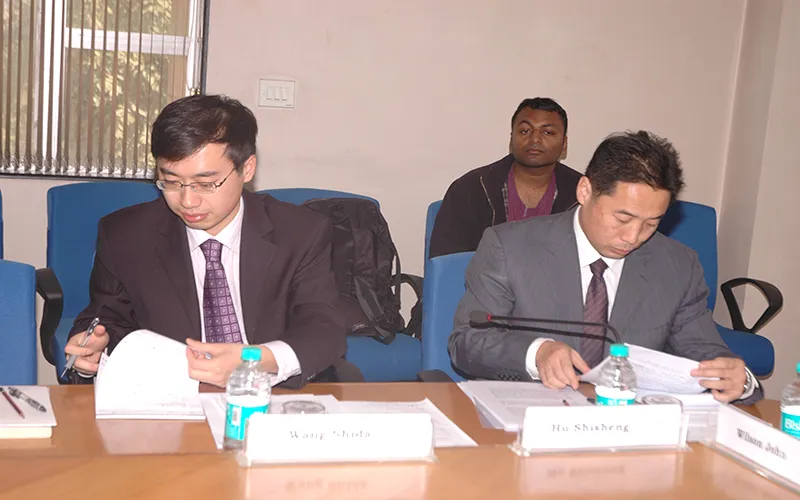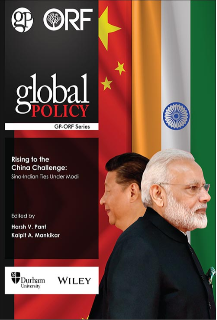Prof. Feng Zhongping, Vice President of the China Institutes of Contemporary International Relations, feels that US's rebalancing strategy in Asia is not entirely designed to contain China but also based on economic considerations.

Prof. Feng Zhongping, Vice President of the China Institutes of Contemporary International Relations (CICIR), feels that US’s rebalancing strategy in Asia is not entirely designed to contain China but also based on economic considerations. Since Asia is home to big economies such as India, China and Japan and given that economic issues are a priority for the US administration, Asia is important for the US. Explaining the US policy on China, he quoted Bill Clinton and said that the policy was to work for the best and prepare for the worst.
Prof. Feng Zhongping, along with other scholars were the CICIR, was taking part in an interaction at Observer Research Foundation on December 1, 2012. The delegation was in India to understand the Indian perspective on the economic problems faced by India, the situation in Af-Pak and US rebalance strategy in Asia.
He said the difference in US and China’s take on International issues remains clearly evident. He emphasised, however, that merely opposing each other’s stance was not enough and the two countries should also work towards providing solutions. Therefore, China needs to provide an alternate in cases when it takes a stance contradictory to the US take on an international issue.
China’s growth in the last three decades had been enormous and much of it has been interlinked with other economies in the region and beyond. Domestic, economic and social problems remain as the primary concern for the Chinese leaders, Prof. Feng Zhongping said, while talking about the challenges faced by the leadership in China.
India and China face a "trust deficit" when dealing with each other. Efforts must be made to reduce the trust deficit and build strategic and critical trust. Deliberating upon the economic relationship, it was suggested that China should open its market to Indian IT and pharmaceutical companies in order to reduce the trade imbalances that exist in Indo-China economic ties.
The importance of Afghanistan to both India and China was discussed during the meeting. It was highlighted that after the withdrawal of the US troops from Afghanistan in 2014, a regional mechanism was needed to address the challenges. It is crucial for the ongoing Indian and Chinese projects in Afghanistan to succeed despite the numerous hurdles. If these projects fail, other countries are likely to shy away from investing in the country. It was suggested that Beijing should invest more in the war-torn nation without expecting returns. More investment infrastructure projects were required to make Afghanistan the bridge connecting South and West Asia. The creation of an "Afghanistan fund" under the existing SAARC fund was also suggested as a way to develop Afghanistan.
While discussing Islamabad’s role in stability / instability in Afghanistan, it was argued that Pakistandid not wish to see any positive investment in the country. It was pointed out that post 2014; Pakistan’s role in Afghanistan was likely to increase. Creation of Pashtunistan was highlighted as one of Islamabad’s primary concerns vis-à-vis Afghanistan. India and Pakistan’s conflict of interests in Afghanistan was also deliberated upon during the meeting. In order to maintain stability in Afghanistan, it was suggested that the positive trends such as independent judiciary and media should be supported. However, it was also argued that a policy of "non-interference" should be followed in this regard. China’s support to Pakistan both military and political was debated during the meeting. China’s assistance in the nuclear arena was pointed as a major hurdle in the improvement of Sino-Indian relations. The existence of nuclear weapons with forward troops of Pakistan and resulting decentralisation of nuclear command were highlighted as issues that would concern not only India but also China.
The Chinese economy will slow down in the future and it will have implications on other economies linked with it, including the Indian economy. While discussing the international financial governance systems, the role played by India, China and the BRICS was underlined.
China’s role in reforming the United National Security Council and India’s membership into the Security Council were also pointed out as some of the issues holding back the Sino-Indian relations. While discussing the recent tensions as a result of the maritime disputes in the South and East China Sea, the Chinese side stated that China had tried to avoid the situation till the other claimants instigated Beijing.
China’s role in the Indian Ocean and the larger maritime strategy was discussed during the meeting which was attended by members of the strategic community, diplomats and journalists. Prof. Feng Zhongping was accompanied by Prof. Hu Shisheng, Dr. Fu Xiaoqiang, Dr. Wang Shida and Mr. Han Liqun from the CICIR.
(The report is prepared by Rahul Prakash, Junior Fellow at Observer Research Foundation)
The views expressed above belong to the author(s). ORF research and analyses now available on Telegram! Click here to access our curated content — blogs, longforms and interviews.




 PREV
PREV

